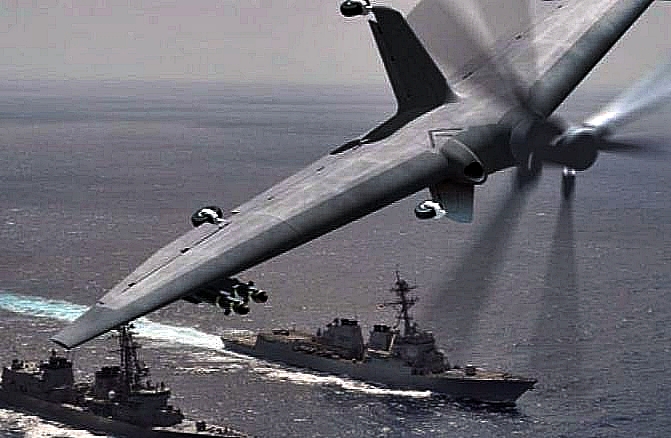Arthur J. Villasanta – Fourth Estate Contributor
Arlington, VA, United States (4E) – A revolutionary new combat aircraft is expected to transform practically all U.S. Navy warships into aircraft carriers without too much fuss.
This odd, triangular shaped aircraft goes by the name “TERN,” which stands for the “Tactically Exploited Reconnaissance Node.” TERN is an unmanned Vertical Take-off and Landing (VTOL) flying wing drone that can both spot and attack Chinese and Russian surface warships.
The fact TERN is VTOL means it can take-off and land on the stern helicopter decks that are standard features in all of the Navy’s Arleigh Burke-class guided missile destroyers; Ticonderoga-class guided missile cruisers and the Independence- and Freedom-class littoral combat ships, among others.
The main objective of the TERN program, which is being run by the U.S. Defense Advanced Research Projects Agency (DARPA), is to develop new unmanned aerial vehicles for the U.S. Navy and Marine Corps that can deploy from small-deck warships such as destroyers.
For intelligence, surveillance and reconnaissance (ISR) and strike missions against enemy ships, the goal of the TERN program is to have a platform with a minimum range of 600 nautical miles and a minimum payload of 500 pounds.
Another goal is to have a warship operating two or more TERNs maintain a continuous ISR presence within the 600 mile operational radius for up to 10 days.
TERN will initially be designed for reconnaissance missions but will ultimately be turned into a weapons system carrying the Navy’s full range of air-to-ground missiles and guided bombs to support the new warfighting strategy called “distributed lethality.”
The Navy defines distributed lethality as “the condition gained by increasing the offensive power of individual components of the surface force (cruisers, destroyers, littoral combat ships, amphibious ships, and logistics ships) and then employing them in dispersed offensive formations known as ‘hunter-killer SAGs’ (Surface Action Groups). It is the motive force behind offensive sea control.”
TERN, which is being developed by Northrop Grumman, has wings and vertical stabilizers with an integrated landing gear at the edges of the wings, as well as control surfaces.
At take-off, the propellers act as helicopter rotors. Once TERN has lifted-off from a ship’s deck, it transitions to horizontal flight.
Two prototypes are currently under construction and flight tests are scheduled for early 2018. DARPA will conduct integrated tests of TERN’s propulsion system. A full-scale engine, gearbox and rotors will be tested at full power.
Article – All Rights Reserved.
Provided by FeedSyndicate
